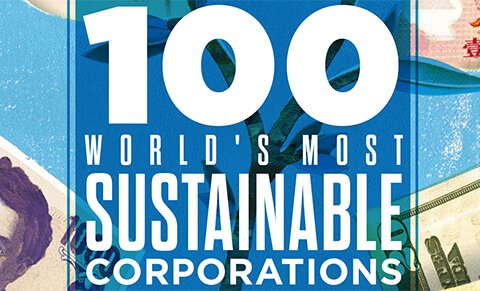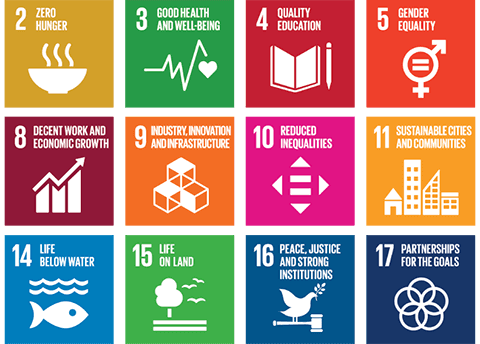For most companies, sustainability is a journey. But it seems Dassault Systèmes, the top company in our 2018 Global 100 ranking (up from 11th last year), was on the road to sustainability from the moment it was created.
It just didn’t know it at the time.
Founded in 1981 as a spinoff from France’s Dassault Aviation, the company has always been focused on helping its customers to reduce waste and become more efficient. “We invented sustainable development before the term existed, even though it was not explicit in our purpose,” says Valerie Ferret, director of public affairs and sustainability. “At the time it was all about optimizing manufacturing processes.”
Although the company started working on product lifecycle management (PLM) in the 1990s, it wasn’t until 2008 that it stated that its purpose was not just to be a scientific company but “to help industry make products that help to harmonize production, nature and life,” Ferret says.
Its 3D Experience software platform allows customers to “virtualize” the design process for products by creating 3D designs and simulating their use on screen before they are made in the physical world. Virtualization is a powerful tool. Ferret notes that before manufacturers were able to create a virtual mock-up of a plane, a car or a power station on screen, they used to have to build physical prototypes. “Now, you just build one virtual mock-up before you can put a machine in the air. This not only saves resources and materials, but also allows you to be more innovative because you can test an infinite number of possibilities in the virtual world.”
Among the aircraft that Dassault’s software has helped design is the ground-breaking Solar Impulse 2, the first aircraft to fly around the world using only solar power. The project used the company’s Engineered to Fly application to design and test within a virtual environment an aircraft that had to be as light and strong as possible – before any aspect of it was physically produced.
Although the company started out creating design tools for aircraft manufacturers, aerospace now makes up only 13 per cent of its sales. The industries it currently serves include automotive, energy, consumer goods and construction. Its products can now even model, simulate, visualize and experience entire cities as they become increasingly connected, integrated and smart.
“Our aim is to virtualize as many industrial processes as possible so companies can ‘make it right first time,’ eliminate waste and cut out mistakes in the real world at every stage from production to end of life disposal,” says Ferret.
While the rapid development of 3D design creates a fantastic opportunity to optimize production processes, “that is not the most important function of the digital world,” she adds. “You can optimize as much as you want, but if you keep growing, you will still have a problem with sustainability. Digitalization also creates the opportunity to transform business models and create strategies based on the sharing economy and the circular economy. What we do is not just about optimization, it’s also about inventing what doesn’t yet exist.”
Dassault Systèmes has been rewarded by changes to Corporate Knights’ ranking system, which this year includes for the first time a focus on the proportion of a company’s revenue that comes from services or products that are environmentally beneficial. “The emphasis on clean revenue changes the whole direction of the ranking,” says Michael Yow, head of research at Corporate Knights. “All of the other key performance indicators are operational and look at internal competencies. For the first time, we are now looking outside of the company and the impact that its products have for customers and the wider world.”
Corporate Knights calculated that a quarter of Dassault’s revenues come from clean products, while its pay link score is 100 per cent due to portions of senior executive compensation being tied to hitting sustainability targets. However, it is not just this indicator that helped the company top the rankings – it scored more than 75 per cent in carbon, water and waste productivity as well as in innovation capacity, the ratio of CEO-to-average-worker pay, leadership diversity and taxes paid. With tech groups under a great deal of scrutiny over the amount of tax they pay, this last factor is particularly important to the company, says Ferret.
“We believe paying taxes is a way to contribute to society. We pay more than 30 per cent of our revenue in taxes. It’s a way to contribute to healthcare, to education and other important things. This indicator means a lot to us.”
Another way Dassault contributes to society is by supporting a number of startups that are using its software to create new products and business models, ranging from wave energy devices to non-obsolescent washing machines built to last more than 20 years. “We only support 15 companies at the moment because we really want to work with them on models that we know will disrupt industry and society.”
Disruption will be a key theme for the company and the wider economy in coming years, Ferret says. “In the past, you needed a large IT infrastructure to do 3D design. Now, with the cloud, we can provide our software online and a startup can use the same products as a company the size of Airbus. We will see more innovation in the next 10 years than we have in the last century.”
Dassault Systèmes believes that “constraints” are necessary to accelerate the pace of change. Regulation is one such constraint but “we believe we are at the limits of what regulation can achieve. However, we will see a huge amount of change because the technology is right and because people are ready for new models based on sharing, not ownership,” Ferret adds.
“Every industry and consumers are extending their use of virtual technology. Consumers expect experiences, not ownership, now. They want mobility, not a car.
“All industries, if they don’t adopt this trend, will disappear eventually.”
Click here to go back to the ranking landing page.






